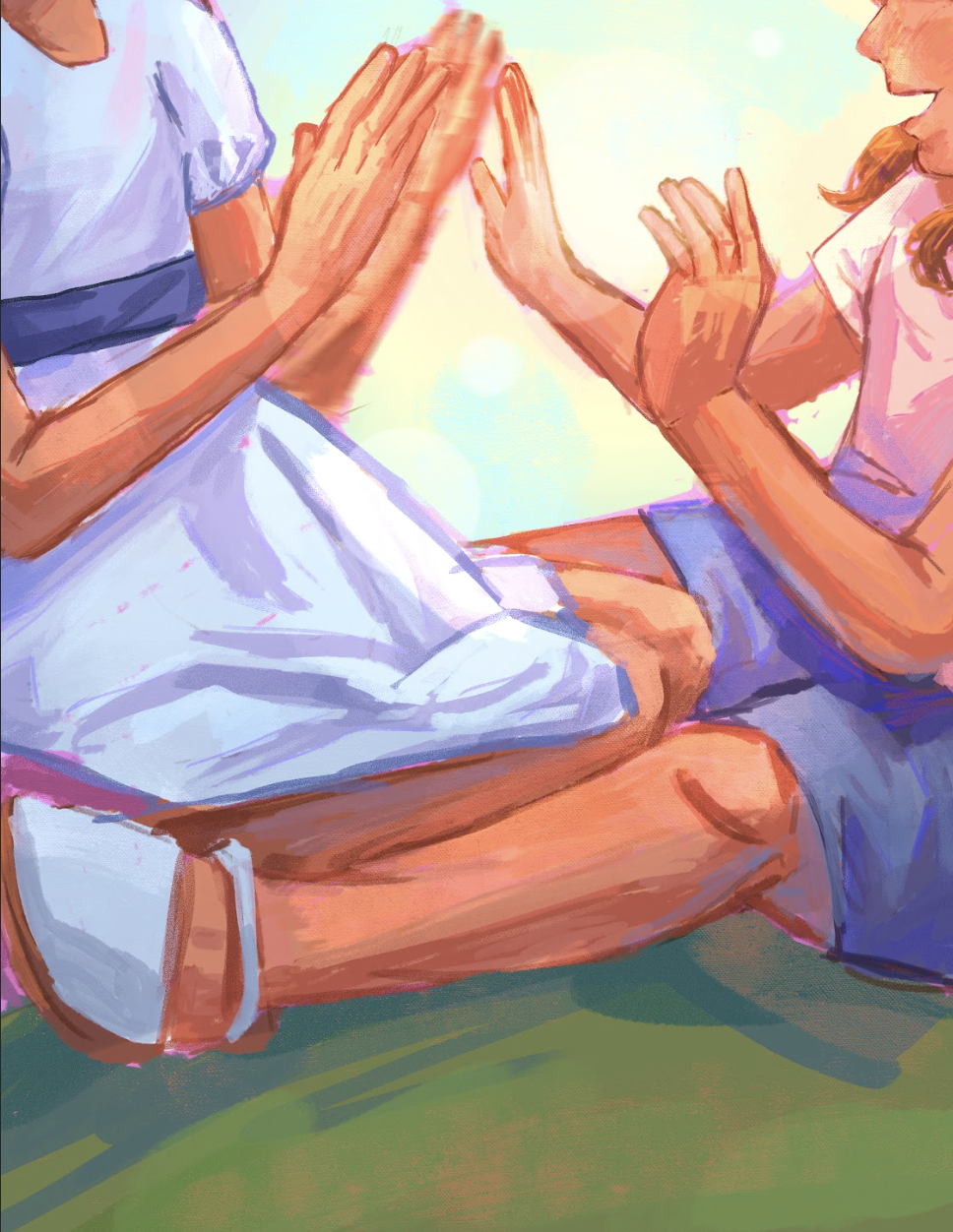Little Intimacies
Illustration by Meghan Zhang
Occasionally I come across a class of kindergarteners, or maybe a group of campers in the summer. They walk in rambling lines, somewhat oblivious to all around them except each step forward. They stare you down with no shame, clearly lost in their own evolving minds. We are but extras in their microcosmic worlds, giants placed to fill the crowds and set the scene for them. They hold hands as they amble forwards together, thinking nothing of these casual touches, these little intimacies they share, likely to be forgotten in the years to come. They fall into community without a second thought. They don’t know anything else. This is their normal.
I spent two summers as a camp counsellor working with ages 3-5. It’s difficult not to fall in love with every squirming little camper that spends their days with you. Children are so quick to trust when they haven’t yet been taught not to. They are so quick to love you, to offer you their hand, demand to sit on your lap or be carried. There are no questioning motives or over-analysis to be formed when they reach for you or for each other with little skepticism in their eyes, no cynicism fading the glow of innocence and youth. It’s bittersweet, remembering what it feels like to be that age before the dirt and grime of nuance and complication colours your perspective.
These little intimacies will carry on for a while. In grade school, I’d go to the park across the street and run up to kids I didn’t know, because everyone was a potential friend. In grade school, we’d sit in braid trains and play with each others’ hair. In the ninth grade, on an overnight school trip, my three best friends and I all squished into one single-sized bed. It was painfully uncomfortable and we woke with sore backs and limbs, but we overlooked it in favour of the comfort of closeness.
But there is no denying the growing distance that comes with the loss of innocence. It’s only appropriate. With age comes understanding of personal space and consent, and the nuances of these considerations. We become more reserved, more protective of our physical and mental proclivities. But that distance between strangers becomes harder to breach, to move beyond arm's length. The world is harsh and unforgiving. It’s difficult to fall into community as easily when you don’t trust each other. We categorize each other as strangers now, when we used to label friends first. There are so many lines to cross, from stranger to acquaintance to coworker to friend to lover to family to enemy. I find it’s hard to take the first steps, that no one really wants to. It is a less than natural feeling.
Some of us are better than others. I definitely fall on the weaker side of the spectrum (I’m working on it, I swear). But there is safety in keeping your cards close to your chest and I feel comfortable in that cocoon. I’m a taurus after all.
Part of this growing distance is a symptom of technology and the nature of the world we live in now. What a tired conversation, the all-consuming terror of technology, put down your phone, touch grass, etc, etc. But unfortunately no analysis is complete without its consideration. Why make new friends when you can reach the old with a few taps on a screen. Why force yourself into visibility when it’s so easy to go incognito, to put headphones on and your head down and pretend to be busy so no one approaches you? It is so easy to reach each other now, and yet so difficult to reach new territories.
At the same time, outside of university towns, young people are mourning the death of house parties. What young person can afford a house these days? We exhaust ourselves with work, with responsibility. What space is left for newcomers? What energy is left to put ourselves out there? Working from home is on the rise, isolating us even further. But hours-long commutes, painful traffic and expensive parking may be the only other option. Is that really a choice?
I worry about this in these upcoming post-grad years. Moved back to the vast suburbs and into my parents’ house, I mourn the loss of casual conversation and acquaintances, of all the possibility and unwavering potential of the microcosm of a university town, especially such a small and walkable area such as downtown Kingston. I mourn the loss of such a high concentration of people my own age, all sharing the same experiences. I mourn the loss of that community, and I wait in apprehension of where I may find it next.
We can learn something from youth, from children making secret handshakes with best friends they met yesterday, from the natural way they fall into friendship and community with each other. They remind us that connection does not have to be calculated, that affection and belonging were once easy, and could be again if we just let each other in. Community won’t and doesn’t look like it did in our youth. Decades have passed, the world has changed and we must change with it. But community still exists. It yearns to be found and we are still drawn to it. The world may demand more from us now, but there is so much significance in leaving space for each other, room for new love and new closeness between us. It may not come as naturally and maybe it never will again, but intention matters. With a little more effort, we’ll find each other again.

